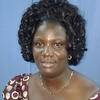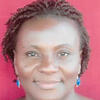As a growing number of governments in low- and middle-income countries take on the provision of early childhood education (ECE), they face the challenge of building a capable workforce of ECE teachers who can provide high-quality, developmentally appropriate instruction to learners at a critical period in their cognitive and social-emotional development. RTI International, with funding from the United States Agency for International Development (USAID), is implementing a pilot kindergarten (KG) program from 2018–2019 through the Read Liberia Activity.
Geanjay Roberts and Patience Suah develop and coordinate training and coaching for KG teachers in 60 Read Liberia schools. They take teachers beyond traditional, lecture-based instruction to play-based, student-centered approaches for teaching oral language skills and emergent literacy. Geanjay and Patience both hold bachelor’s degrees in education management. Patience has worked in the education sector for over 25 years, focusing on early childhood development for the past 10, while Geanjay has 16 years of experience working in education, focusing on early childhood for the past seven.
We sat down with both of them to learn more about their experience with the KG teacher training pilot, and its implications for improving ECE quality of instruction.
What challenges is Read Liberia trying to address through its kindergarten pilot and teacher training?
After it produced large gains in reading performance, USAID’s EGRA Plus: Liberia task order was scaled up through the Liberia Teacher Training Program. (These two programs concluded in 2011 and 2015.) Although the training approaches that they devised continued to have an impact on reading outcomes at scale, we expected more, and we began to look at other factors that were influencing early grade literacy. Children’s lack of oral language skills was evident in grade 1, and it was delaying their learning how to read. We believed that to improve reading results at the end of grades 2 and 3, we needed to start the work in KG.
One of the main goals of the KG teacher training is to improve the quality of early childhood teaching. Because the Ministry of Education had taken on the responsibility of providing universal public KG, teachers were, in theory, coming into our pilot trained in some aspects of KG instruction. When we met with teacher coaches who had been in KG classrooms, however, and when we held our first day of KG teacher training in August 2018, we quickly realized that KG teachers were lacking the most basic skills for teaching oral language.
What underlying principles drove the development of training procedures and materials? How do you train kindergarten teachers?
Our KG trainings focus on building up young children’s oral language skills. If we can expand children’s vocabulary, we know they will be better able to express themselves, develop ideas, and use these words when learning to read and write. When it comes to training KG teachers, we found we needed to start with the basics by helping them first master their pronunciation of letter sounds in English. By the time of the refresher training in February 2019, teachers were ready to learn blending of multiple sounds.
Our KG teachers are trained by Ministry of Education certified master trainers, who also took part in the Read Liberia materials development. Where we began with teachers in our initial training was informed by what teacher coaches and program supervisors had been seeing when they visited classrooms. We try to meet teachers where they are, and not where we want them to be. We learned from the classroom visits that we needed to address KG teachers’ ability to manage a classroom in our trainings. They need this skill especially when their classroom enrollments are well over the Ministry of Education’s 20-student limit for KG.
Our approach is very different from having training participants sit still and listen to facilitators talk, which is the method that KG teachers are most used to. We use a model-based approach, meaning that we demonstrate one particular skill at a time, apply it through a demonstration lesson, and then allocate much of the rest of the time for teachers to practice the skill in small groups.
One strategy that has worked well is emphasizing teaching aids. Most of our KG teachers had never developed materials before. The materials, once made, helped guide teachers and learners through lessons. Another strategy that we use, and that many KG teachers haven’t seen before, is to take the training sessions outside, to show teachers that even without classroom structures or with limited facilities, they can still teach through play.
What were your initial experiences with the kindergarten teacher training? What outcomes have you seen so far, and what are the implications for improving teaching quality?
The cadre of KG teachers that we work with are used to standing in front of a class and using a lecture style of teaching. One teacher even said at a training, “You know, in grade 1, learners have to take notes, so we prepare them for that.” We had to help teachers see KG differently and understand what is developmentally appropriate for young learners.
In one session, our trainers encourage teachers to try new ways of teaching a story—for example, first reading it aloud, and then asking students to dramatize the story. We have our challenges. Some KG teachers are older, and they have difficulty physically with play-based activities, especially ones done outside. For the most part, however, teachers are enthusiastic, especially when it comes to making materials.
The ECE bureau of the Ministry of Education (MoE) developed a schedule for KG teachers to follow, which is printed in the official MoE Kindergarten Planner. Previously, teachers couldn’t fill the allotted time in the classroom due to a lack of materials and training. But when Theresa Caesar, our KG Teacher Training and Coaching Supervisor, came back from a round of classroom visits following our initial training, she told us that seven out of eight KG classrooms she went to were now decorated like “real” KG classrooms with posters and locally made materials, and that all teachers she visited were using teaching aids they had learned to make to deliver full length lessons.
One of the key behavior outcomes we want to achieve with training is getting children actively involved and engendering in them a love of learning.
One of the key behavior outcomes we want to achieve with training is getting children actively involved and engendering in them a love of learning. That means many of our sessions emphasize play that allows learning to take place. In one session on oral vocabulary, for example, we work with teachers to go beyond repetition and to draw or demonstrate the words with learners. Even if a teacher doesn’t have access to poster paper and markers, or chalk and a chalkboard, she can show children on her face what “sad” or “mad” looks like. Our coaches and supervisors have noted in their feedback that when teachers use the new, play-based activities they are trained in, students are involved and excited.
What are the next steps for the kindergarten teacher training pilot, and what additional research, funding, and programming are needed?
When we tested KG teachers before and after their trainings, the post-test results showed improvements in their knowledge and skills. In two years, Read Liberia will conduct an Early Grade Reading Assessment in grade 2 with children who received the KG pilot program. Because the KG pilot is being implemented in 30 of the 640 Read Liberia schools, we will be able to compare their reading outcomes to those of children whose KG teachers did not receive this training. We are also conducting an endline with Grade 1 students in treatment and comparison schools looking at letter knowledge, phonemic awareness, listening comprehension, and expressive vocabulary. The endline will be able to look at the effect of teacher training after they practice the new intervention for two years.
At the refresher KG training in February, we reviewed basic skills, including letter sounds and decoding. We focused on scripted lesson plans, but we also knew we would have to go back and include foundational skills, which we did. In other words, we cannot just tell teachers to enforce lesson plans. The refresher training also focused on effective classroom management, and on allowing students to work together in small groups and pairs to practice what they’re learning.
How do you think kindergarten teacher training like the one piloted through Read Liberia could be expanded?
The Read Liberia KG teacher trainings could be used in all counties in Liberia, working with the Ministry of Education. One thing we would like to see, though, is improved KG settings to better support teachers as they professionally develop. Somehow, we should ensure that learners have sufficient space, and that class sizes and teacher-to-learner ratios are manageable.
If we had more funding, we would also intensify and increase training specific to ECE. In Liberia, more highly qualified teachers typically are assigned to upper primary grades. Because the early years are so important to children’s outcomes, we must make sure that we have our very best teachers in KG, and that training is being provided to get all KG teachers caught up on best practices.


